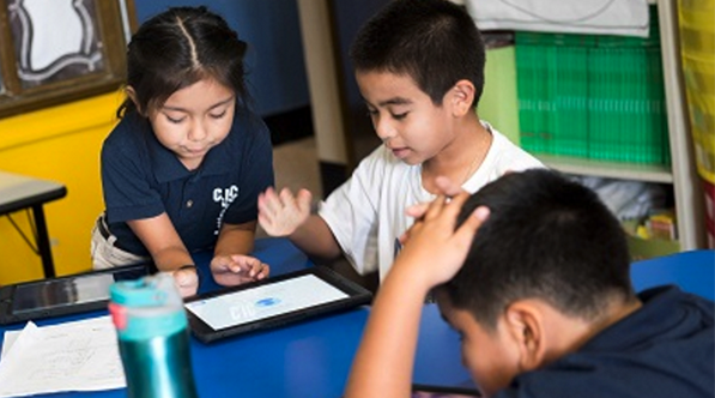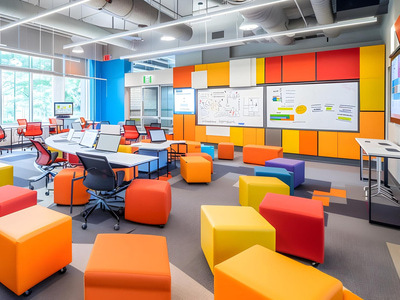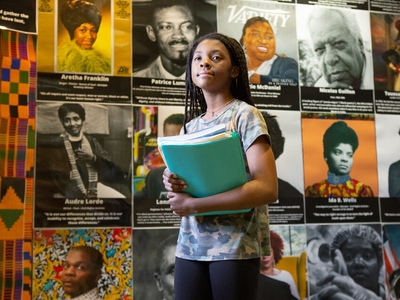New Designs for School
How Project-based Learning Can Support Student Agency
Topics

We’ve all had the experience of truly purposeful, authentic learning and know how valuable it is. Educators are taking the best of what we know about learning, student support, effective instruction, and interpersonal skill-building to completely reimagine schools so that students experience that kind of purposeful learning all day, every day.
Practitioner's Guide to Next Gen Learning
Authentic learning experiences, reflection, student voice and choice, and connections to community elevate project-based learning by honoring student agency.
When participants in a recent #NGLCchat on Student Agency were asked how project-based learning supports student agency, their answers revolved around these themes: authentic learning experiences, reflection, student voice and choice, and connections to community. We saw some of the same themes emerge when we asked how blended learning and competency-based learning supports agency, which I blogged about previously.
Project-based learning supports student agency when it...
Connects a student’s hand, mind, and heart with projects that matter. It helps students “learn to do” and “learn to be.”
Creates sleuths, scientists, artists, scholars, musicians, dreamers, and, most of all, autonomous learners.
Is collaborative, creative, authentic, and reflective. Students own the projects, solve problems, and manage time. They use their agency when they control some of the variables for learning, in personalized, or student-designed, project-based learning.
Empowers students through voice and choice and builds community and encourages collaboration, enabling students to explore their interests, find passion, and challenge themselves.
Starts with a “messy question” and students need to self-organize their learning in order to develop answers. It deeply engages students in the act of learning.
Makes projects "main courses," the unit of instruction. The project is the learning. Students exercise agency as they work through the project and find strategies for learning that work for them. Whole game learning from David Perkins offers seven principles, grounded in learning science, that you can use to develop authentic projects that support students in the act of learning. See MyWays Learning Design for more.
Involves creation and making something that wasn’t there before. Bringing something new into the world is a powerful human drive, according to Larry Rosenstock of High Tech High.
“Fosters young people’s sensitivity to the designed dimension of the world, which may be a powerful way to increase their sense of agency,” according to Agency by Design and Lighthouse Community Charter School: “As students become more aware of the design of the world around them, they begin to see themselves as people who can affect that design and are also empowered to actually do the work—to tinker, hack, and improve design”
Links maker ed and the local community. Incubator School emphasizes impact projects: Where, how, at what level do you want to make a difference? What do you need to learn to do that? Project H believes that design is a “social act that builds citizenship in the next generation.” Other forms of service-learning are agency-building as well.
No Reason to Be Bored from Project H Design
Resources for Implementing Project-Based Learning
- Getting Started With Project-Based Learning (Hint: Don't Go Crazy) - Andrew Miller, Edutopia
- 5 Projects for Your Project-Based Learning Classroom This Year - Lucy Kosturko, Getting Smart
- Setting the Standard for Project Based Learning: A Proven Approach to Rigorous Classroom Instruction - John Larmer, John Mergendoller & Suzie Boss, ASCD
- Transforming Schools Using Project-Based Learning, Performance Assessment, and Common Core Standards - Bob Lenz, Justin Wells, Sally Kingston, BIE
My appreciation goes out to everyone who participated in the #NGLCchat. I learned so much in that hour of professional learning about how to elevate next gen learning practices so that they embrace, honor, and encourage student agency. Thank you. I also want to recognize the #NGLCchat guest experts for guiding the conversation to such depth and passion:
- Grace Belfiore, Researcher and author, lead developer of MyWays project
- Dave Lash, Researcher and author, lead developer of MyWays project
- Andrew Miller, Consultant with Buck Institute and ASCD
- Casey Montigney, Teacher at Medill-Shue Middle School, member of the Carnegie Foundation’s Student Agency Improvement Community
- Michele Savage, Principal of Medill-Shue Middle School, member of the Carnegie Foundation’s Student Agency Improvement Community
Related Posts
How Next Gen Learning Can Support Student Agency - Ownership. Freedom. Respect. Trust. Courage. Souls on Fire. Find out what student agency is and why it’s so important to education today.
How Competency-Based Learning Can Support Student Agency - When students design their own pathway, are free to fail/free to learn, and demonstrate mastery through self-directed assessment, student agency thrives.
How Blended Learning Can Support Student Agency - Blended learning puts students in the driver’s seat of learning by increasing their voice, choice, and motivation.




